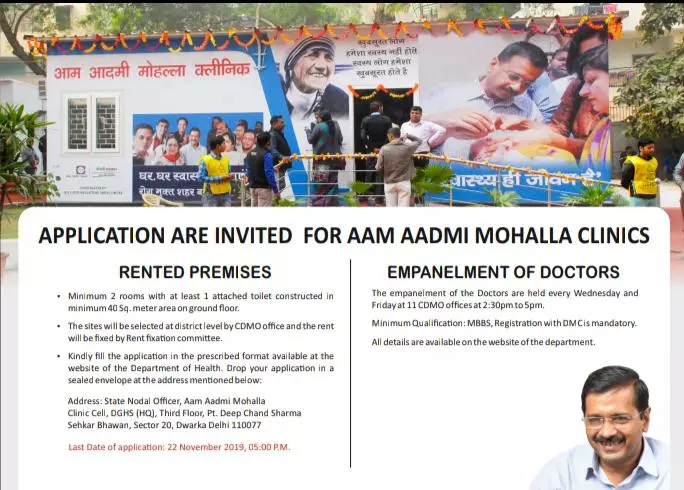Delhi’s rented Mohalla Clinics to be shut down
Inspections of 74 selected clinics showed: 10 lacked drinking water facilities, 21 lacked toilet facilities, 12 were not accessible for the disabled, 31 did not have sufficient drug storage space

New Delhi: The Delhi government is moving to close down Mohalla Clinics currently operating from rented premises amid allegations that many of these properties are linked to individuals associated with the Aam Aadmi Party. This comes soon after the removal of the personal staff of the AAP chief minister and ministers.
According to sources, 177 of the city’s 523 Mohalla Clinics — nearly 34 per cent — are functioning in rented spaces, with suspicions that the rent payments were channelled to AAP workers or their relatives. “All these clinics running on rented properties will be reviewed and closed,” a reliable source told this newspaper, adding that the remaining clinics will continue under a new name, Ayushman Arogya Mandir, after thorough checks and modernisation.
A performance audit of Primary Health Care in Delhi from 2016-17 to 2021-22 reveals that the Directorate General Health Service (DGHS) could only spend ₹9.78 crore — just 28 per cent of the allotted ₹35.16 crore — on constructing Primary Health Centres. The audit highlighted overall deficiencies in the planning and implementation of the Aam Aadmi Mohalla Clinic (AAMC) project, noting savings ranging from 31.44 per cent (2022-23) to 86.36 per cent (2018-19).
The Comptroller and Auditor General (CAG) report, which has yet to be tabled in the Delhi Assembly, finds that the government missed its own target of setting up 1,000 clinics by March 31, 2017, managing to establish only 523 by March 31, 2023. Of the 218 AAMCs audited in four districts, 41 remained closed for periods ranging from 15 days to 23 months due to the de-empanelment, resignation, or leave of doctors.
Inspections of 74 selected clinics showed: 10 lacked drinking water facilities, 21 lacked toilet facilities, 12 were not accessible for the disabled, 31 did not have sufficient drug storage space.
Additionally, many clinics lacked essential medical equipment, including pulse oximeters and glucometers, while more than half had fewer than 75 per cent of essential medicines available.
The report indicates that 70 per cent of patients received less than one minute of consultation at Mohalla Clinics between October 2022 and March 2023. Further, out of the required 11,191 inspections of 218 clinics from March 2018 to March 2023, only 175 were carried out.
Shortages of doctors, nurses, and pharmacists persist across the Mobile Health Scheme (MHS) and School Health Scheme (SHS): 76 out of 100 medicines in the MHS Essential Drug List were unavailable in central stores. Coverage of school children under SHS remained low, at 2.81 to 3.51 lakh out of 17 lakh students between 2016 and 2020.
The planned expansion of polyclinics, aimed at easing outpatient loads at state-run hospitals, also fell short, with only 28 out of a targeted 150 becoming functional by 2018-19.
District Drug Stores faced severe space and environment constraints: DDS, South operates out of a basement lacking proper ventilation or air conditioning, with medicines often stored on the floor, near toilets, or on staircases.
Launched in 2015, Mohalla Clinics have been a flagship initiative of the previous AAP-led government but have since been dogged by controversies. Lieutenant Governor V.K. Saxena ordered a CBI probe into alleged fake diagnostic tests at these clinics, suggesting potential financial gains for private laboratories.
With the Delhi government’s latest move to discontinue many rented-site clinics and rename the remaining ones, officials say they aim to address these systemic shortcomings and deliver improved primary healthcare through the proposed Ayushman Arogya Mandir facilities.
